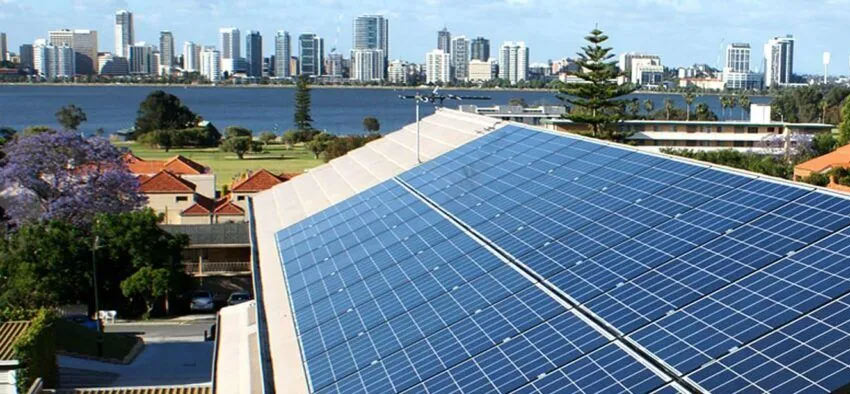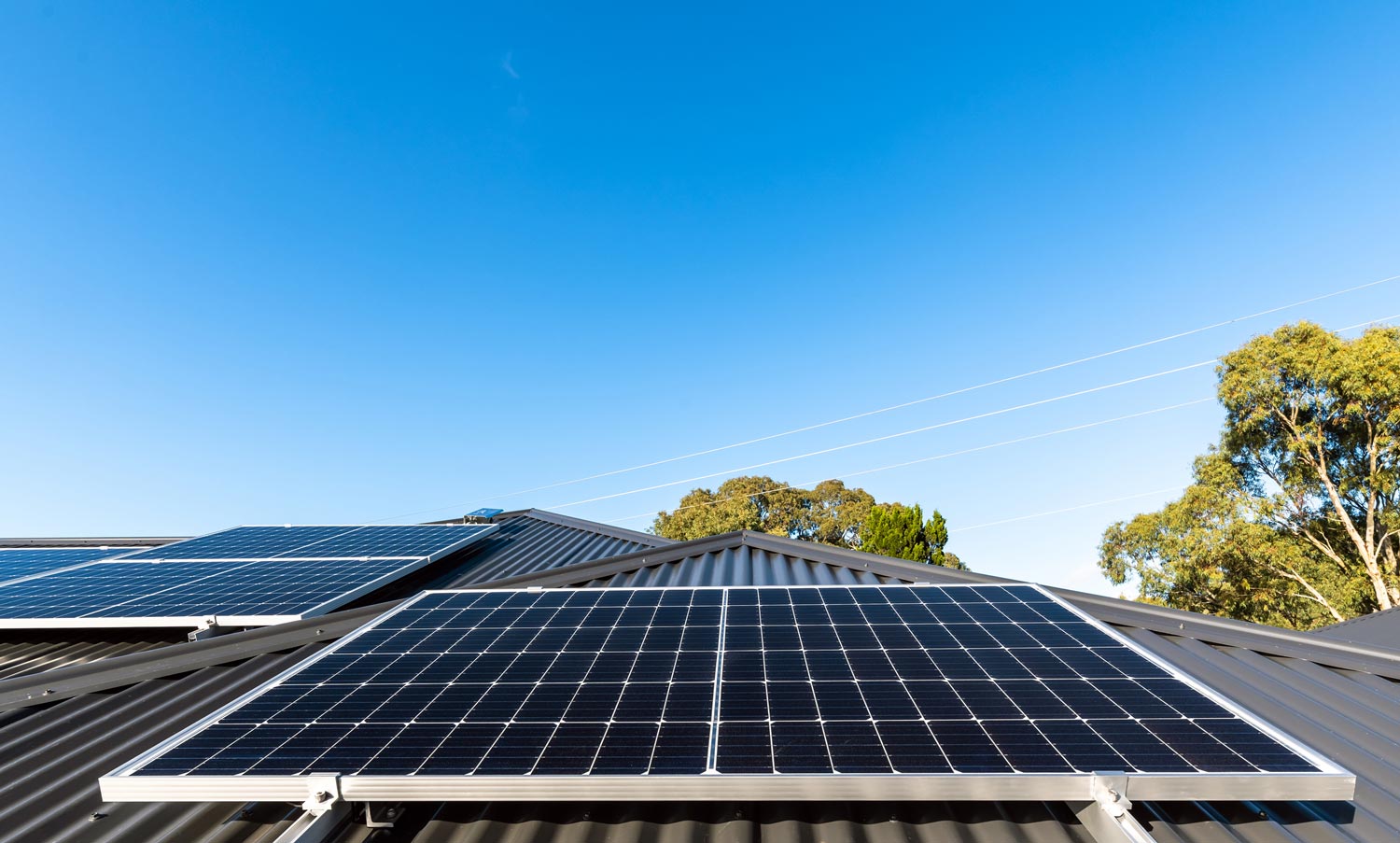Home Solar Installation in Perth
Solar Installation in Perth – New 2025 Cost Guide
As the cost of electricity soars, an increasing number of people in Perth, alongside many Australians, are switching to solar energy to cut down on their bills.
The only barrier to this move for most homeowners is the cost of solar installation in the area. Solar panels have predominantly been known to be quite expensive. But since the prices have been falling over the years, and the introduction of several government solar incentives, more Perth residents can now afford to go solar.
Table of Contents
ToggleSolar Installation Cost Perth
The average cost of solar installation in Perth depends on the size of the solar system you want to install.
The most popular sized solar system being sold in Perth is a 6kW system. This will cost you $7,387 on average.
Any local solar installer quoting more than 10% higher on that price, should be skipped over.

| 1.5 kW | 2kW | 3kW | 4Kw | 5Kw | 6Kw | |
|---|---|---|---|---|---|---|
| Perth WA | $3,357 | $3,785 | $4,453 | $5,368 | $6,284 | $7,387 |
Is Perth WA a good place for solar?
Based on the installation prices alone, Western Australia is an excellent place to go solar. Among the many factors that make it such a great location includes:
Lots of sunshine
Perth enjoys one of the longest sunlight hours in Australia thanks to the long hot, and dry summers experienced in the area. On average, Perth records around 5.3 peak sunshine hours per square meter per day.
However, the hours could go as long as 8.2 hours during the summers (Nov – Feb). These more hours mean more energy production and hence more savings.
Moreover, the larger the solar system you’ll have, the better your solar output will be. Here’s how much you can expect from your solar system in Perth.
Great rebates
The generous rebate programs available for Perth residents are also a major reason residents should go solar. The federal government provides massive incentives to all Australian residents in the form of redeemable small-scale technology certificates (STCs) for purchasing solar systems.
These rebates are usually very generous with states that receive more sunlight hours and also favour residents with large system sizes.
The discounts usually cater to nearly 30% of the total solar system cost, making them more affordable to residents.

Generous feed-in tariffs
Utility companies in Perth also offer some of the best feed-in tariff rates in Australia. This presents a great opportunity for residents to cut their energy bills and also improve the payback period of the solar system.
The Feed-in Tariff (FiT) means that you can sell back your surplus electricity for credits on your power bills. And with Perth allowing the generation of a lot of power, you can export a decent amount of energy back to the grid to help offset your bills.
Falling solar prices
Owing to the stiff competition in Australia’s solar market, the cost of solar installation in Perth has drastically gone down – and this trend is set to continue. It’s now easier than ever to get quotes from numerous contractors to get one that meets your budget.
Moreover, the falling prices coupled with the impressive solar rebates offered in Perth, make solar installation very affordable.
What is the solar rebate in Perth?
Unlike most Australian states, the Western Australian government doesn’t offer a state rebate program. Perth residents have to rely on the federal rebate program for their discounts.
As you purchase your solar system in Perth, the rebate is usually already priced on the system. The rebate amount depends on the size of the solar system you receive and your location.
The more electricity your solar system can generate, the more rebates in the form of Small-scale Technology Certificates STCs you’ll receive.
Take a look at how much discount WA residents receive depending on the size of their systems. Bear in mind, the price of STCs keeps on fluctuating from time to time so these prices might vary in the market.
| System size | STC’s | STC spot price | Rebate |
|---|---|---|---|
| 2kW | 16 | $39.90 | $638 |
| 4 kW | 33 | $39.90 | $1,317 |
| 5 kW | 41 | $39.90 | $1,636 |
| 6kW | 49 | $39.90 | $1,955 |
| 7Kw | 58 | $39.90 | $2,314 |
| 10Kw | 82 | $39.90 | $3,272 |
Is the solar rebate ending soon?
Yes. The federal solar rebate program is bound to end on the 31st of December 2030. The government is slowly phasing it out by reducing the rebate amount by 1/15th every subsequent year till the end.
Despite this fact, there are still around 10 more years left before it happens and the rebate amounts are still substantial. Therefore, you should take this advantage to install your solar now while you can.
What is a typical feed-in tariff in Perth WA?
When it comes to the feed-in tariff, western Australia does things differently. Since the state government determines the electricity prices in the residents are limited to feed-in tariffs from Synergy and Horizon Power only.
As a result, the feed-in rates in Perth are generally lower than the maximum rates offered in other states.
For a long time, the rates stood at a fixed 7.135kWh (Synergy). However, as of August 31st this year, the Western Australia state government shifted from its traditional, Renewable Energy Buyback Scheme, (REBS) to the Distributed Energy Buyback Scheme, (DEBS).
Under DEBS, homes will receive a feed-in rate of 10 cents per kilowatt for electricity generated between 3 pm and 9 pm and a feed-in rate of 3c/kWh all other hours.
These changes take effect from November 6th. The goal of these changes is to encourage more homes in Perth and WA to consume more of their generated energy during the day before 3 pm.
Tips for choosing a good solar installer in Perth
While making the decision to go solar is a huge milestone, choosing the right installer is even more vital. Perth has experienced a surge in the number of solar installers over the past few years.
According to the Clean Energy Regulators inspections, 16% of all installed units are underperforming while 4% are unsafe. This shows that you just can’t settle for the first installer that gives you a quote.
Here are a few tips to get you going:
1. Check their Accreditation
Before discussing any details about your installation, your first tasks should be ensuring that the company you’re engaging with is accredited with the Clean Energy Council (CEC).
This accreditation proves that the installers have gone through the proper training to complete your installation.
You can find the list of all accredited solar installers in Perth on the CEC website.
2. Do they use subcontractors?
Secondly, confirm if the installer you want uses subcontractors to complete the job. While subcontractors aren’t entirely terrible, in most cases, sub-contractors do really shoddy jobs since they weren’t trained.
Companies with an in-house team tend to do a better job, right from their organization, CEC accreditation, and experience.
3. Go for experience
How long has the business been in the market? Has the company done a similar project before? You need to know that the company you’re trusting for your installation really understands the installation process.
Look for online reviews, ask for testimonials, and talk to their previous clients to get the assurance for your installation.
If the company keeps taking you in circles regarding their experience in the field, then probably that’s a potential red flag.
4. Company should be in Perth
The solar installation company you choose should also be in Perth. This is because a company founded in this location understands the solar requirements of the panel on your roof. They also have a better relationship with other suppliers, which helps you to get the best deals on different solar parts.
5. System warranty
The warranty of your solar system should also top your list. In most cases, each component will come with its individual product warranty. Ensure you’ve read the terms of these warranties, and you understand them. A good, accredited retailer should also provide a warranty for the entire system.
FAQs
How much can I save on my power bill?
The average Australian household consuming 20kWh can expect to save between $1500 – $1800 every year on power bills with a 5kW solar system. Your potential savings, however, is determined by your location, the size of your solar system, and your home’s power consumption.
Generally, households that consume a lot of power tend to save the most with solar panels. Homes with bigger solar systems also save more than those using smaller systems.
How long to panel pay for themselves?
Usually between 3 and 5 years. However, some homeowners can also wait for only 2 years while others 6-8 years before the solar panel’s payback. This is because of your usage patterns, your location, and the size of your solar system.
The more solar energy you consume in your home, the more you’ll save, and hence, the faster the system pays back. Larger solar systems also tend to payback faster than smaller systems because of the energy production rate.
Regarding your location, solar panels in states and cities with high sunlight intensities like Perth and Adelaide usually have a quicker payback period than those with lower intensities, e.g., Hobart, Canberra, and Melbourne.
Should I get a battery?
Yes and no. The decision to go for a solar battery is a tough one. On one hand, solar batteries allow you to store your surplus power for later use at night. This reduces your reliance on the grid.
On the other hand, solar batteries are quite expensive. They even cost more than the solar system itself. And with the limited battery incentives available in most states, getting a battery is only for those with deep pockets.
Otherwise, sticking to your rebate programs and feed-in traffic should be more than enough.
Is there a solar battery rebate in Perth WA?
In some way, Yes. Even though the Western Australian government wants to abolish these rebates and incentives. The state offers loans of up to $6,000 for solar battery installations.
Compare Solar Panel Quotes
Table of Contents
Toggle









